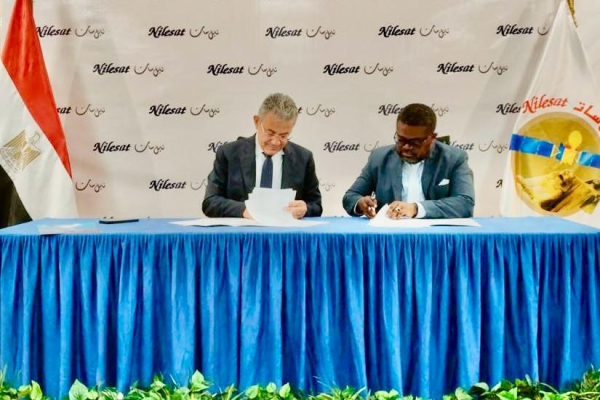- RASCOM and Egypt’s Nilesat sign MoU to boost Africa’s space sector
- Agreement signed April 23 aims to enhance satellite capacity use, training, and innovation
- Parties to collaborate on infrastructure, platforms, and marketing of satellite services
- A dedicated marketing services contract was also concluded alongside the MoU
The Regional African Satellite Communications Organization (RASCOM) signed a memorandum of understanding on Wednesday, April 23, with Nilesat, the Egyptian national satellite operator. The two parties thus demonstrate their willingness to collaborate further to accelerate the development of the African space sector.
The main areas of collaboration focus on the commercialization of satellite capacities, training, innovation, and research. Both parties commit to pooling their expertise, platforms, applications, and satellite infrastructures. A marketing services contract was also concluded between them.
“This partnership marks a strategic convergence of our common objectives: to stimulate innovation, promote knowledge sharing, and advance satellite services in the region. Together, we aim to provide enhanced connectivity and promote skills development in the space sector,” said Hesham Lotfy Sallam, Commercial Director at Nilesat.
The establishment of this partnership comes shortly after the launch of the African Space Agency (AfSA), intended to structure the continent’s space initiatives. The agency is dedicated to the collection, analysis, and sharing of spatial data, in service of the continent’s sustainable development. This cooperative dynamic illustrates the growing momentum of the African space sector, with a multiplication of national initiatives. Last March, Botswana launched BOTSAT-1, its first satellite. Seventeen other countries on the continent have also already put satellites into orbit. Egypt leads the list with 14 spacecraft, followed by South Africa (13) and Nigeria (7).
Africa seeks to strengthen its position in the global space market, whose growth is accelerating. According to data recently cited by the Senegalese government, the global market is expected to exceed 737 billion dollars in the next decade. Space in Africa indicates that the value of the African market was estimated at 22.6 billion dollars in 2024.
Beyond these economic prospects, space technologies offer strategic advances in precision agriculture, natural resource management, environmental monitoring, and telecommunications. For this latter area, the Global System for Mobile Communications Association (GSMA) estimates that satellites have the potential to provide universal coverage in Africa, where a large part of the population is still deprived of mobile phone and Internet services.
Isaac K. Kassouwi



















